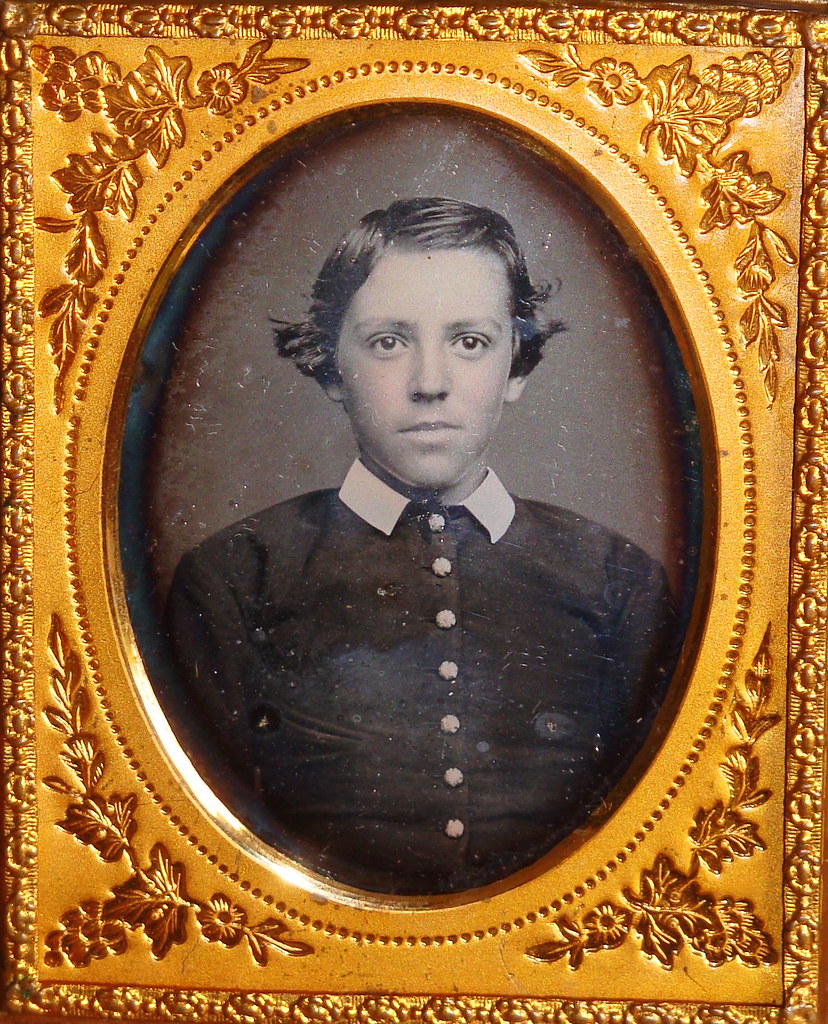The Legend of Lemuel Robinson and Two Brass Cannon
After The Road to Concord was published, Earl Taylor of the Dorchester Historical Society sent me some pages from a book that preserves another family tradition about the Boston train’s stolen cannon.
The book is titled A Family Story, and the author was a great-grandchild of Lemuel Robinson of Dorchester. Which great-grandchild is unclear—there’s no author name on or inside the book. It ends with an 1888 letter, so the University of California cataloguer guessed the book was published around 1889.
The opening page quotes from an 1870 Robinson genealogy by the author’s brother Edward. That quotation matches a passage in William and Anne Robinson of Dorchester, Mass., by Edward Doubleday Harris (1839-1919, possibly shown here—see Leigh McKinnon’s Flickr page for the mystery). That genealogy was published in 1890, so either the author of A Family Story alluded to an earlier edition or that 1870 date is a misprint.
Edward’s book lists his siblings still living in 1890. Given the reticence, I suspect the Family Story author was one of his sisters—which narrows our search down to a mere five candidates.
The oldest Harris sibling, William Thaddeus Harris, had been librarian of the New England Historic Genealogical Society. Several other relatives wrote antiquarian and historical books, so the family standards for historical evidence were above average. At the same time, the audience for this book was clearly other members of the extended family, unlikely to be skeptical about tales of ancestral heroism.
So here’s what A Family Story says:
TOMORROW: Assessing the details.
The book is titled A Family Story, and the author was a great-grandchild of Lemuel Robinson of Dorchester. Which great-grandchild is unclear—there’s no author name on or inside the book. It ends with an 1888 letter, so the University of California cataloguer guessed the book was published around 1889.
The opening page quotes from an 1870 Robinson genealogy by the author’s brother Edward. That quotation matches a passage in William and Anne Robinson of Dorchester, Mass., by Edward Doubleday Harris (1839-1919, possibly shown here—see Leigh McKinnon’s Flickr page for the mystery). That genealogy was published in 1890, so either the author of A Family Story alluded to an earlier edition or that 1870 date is a misprint.
Edward’s book lists his siblings still living in 1890. Given the reticence, I suspect the Family Story author was one of his sisters—which narrows our search down to a mere five candidates.
The oldest Harris sibling, William Thaddeus Harris, had been librarian of the New England Historic Genealogical Society. Several other relatives wrote antiquarian and historical books, so the family standards for historical evidence were above average. At the same time, the audience for this book was clearly other members of the extended family, unlikely to be skeptical about tales of ancestral heroism.
So here’s what A Family Story says:
We have found mention in the Provincial Records of the field pieces which Col: Robinson succeeded in taking out of Boston under the very eyes of the sentries. . . . The patriot army needed much these field pieces, the property of the province, but no fire arms nor ammunition were allowed to be taken out of Boston; strict watch was kept that none should be removed.The first line about “Provincial Records” produces some skepticism for me. Our unnamed author has clearly done some research about the brass cannon taken from Boston, two of which at that point had been on display in the Bunker Hill Monument for decades. As a result, we’re not getting the unvarnished Robinson family tradition. We’re getting that tradition polished and perhaps trimmed to fit around the enshrined cannon and the author’s other sources.
Col. Robinson donned a carter’s frock and mien, and drove into Boston with a large load of fresh garden truck which the inhabitants would gladly welcome;—later why should he not drive innocently out again, past all the keen-eyed, vigilant sentries[,] his large wagon heaped with a huge load of manure which the town desired to be rid of? (When I look at the portrait of the Colonel, I wonder that his eyes had not betrayed him!) Before many hours passed[,] the field pieces—two brass cannon—from beneath their malodorous cover, were snugly hidden in Colonel Robinson’s barn, northeast of his dwelling house.
You all perhaps have heard the tale of the search by the exasperated British soldiers sent out by the orders of Gen: [Thomas] Gage, when it became known that the field pieces were gone, and suspicion turned upon Col: Robinson; how they came to our ancestor’s house and found only women and children to answer their angry questioning, who could give them no information concerning the missing treasure. After searching the premises, they turned to the barn and swinging open the great [front] doors, were confronted by such a mass of cobwebs across the entrance, that a laugh burst from them all, and they turned horse and rode away—leaving the field pieces for the use of the Continental Army.
TOMORROW: Assessing the details.


No comments:
Post a Comment